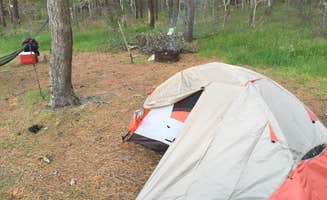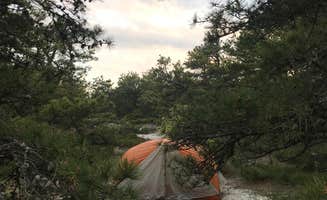Tent camping near Menemsha, Massachusetts offers access to coastal wilderness areas with distinctive maritime ecosystems. Campsites in this region are characterized by sandy terrain, salt-influenced vegetation, and coastal vistas. The camping season typically extends from mid-May through October, with variable coastal weather patterns requiring appropriate preparation.
What to do
Beach exploration: Sandy Neck Beach Park primitive sites serve as a base for exploring the Cape's northern shoreline. Campfires are permitted on the beach at night, creating opportunities for sunset viewing. "You need a sandy neck ORV pass and a self contained camper (toilet) to camp here, but it's very worth it. Right on the water, relaxing and sunny most of the time," notes Matt R.
Kayaking to campsites: Washburn Island Campsites require water transport to reach the camping area. The island's proximity to mainland makes it accessible even with personal watercraft. "You need a boat or a ride out there, close to the main land so a canoe/kayak would work," explains Tim C., highlighting the island's accessibility despite its boat-in requirement.
Off-season camping: Late season camping offers different experiences with fewer crowds but potentially challenging weather. "Took one more trip down for the end of the season, great weather but VERY windy," reports a camper about October conditions at Sandy Neck Beach Park.
What campers like
Island solitude: Sandy Neck Beach Park Primitive Campsites provide backpacking opportunities without leaving Cape Cod. The hike-in requirement creates natural limitations on visitor numbers. "This is a really cool option for those interested in visiting Cape Cod and also backpacking," explains Anna C.
Water views: Camping sites at Washburn Island each feature water vistas. The island layout maximizes shoreline exposure for campers. "Small island with 10 camp site (one group) all with views of the water very quiet at night," reports Tim C.
Beach sleeping: Direct beach camping represents a unique regional opportunity. "This is one of the few places where you can sleep on the beach! It's a great place. The water is on the cold side but it's worth it. Beach camping is a very special thing," shares Matt R. about the Sandy Neck experience.
What you should know
Resource logistics: Sandy Neck sites require planning for water and supply needs given the distance from facilities. "A nice amenity is that the park staff will send someone to the sites to deliver 5 gallons of water for free as well as firewood for a small fee so you don't have to carry those resources," notes Anna C.
Reservation timing: Booking strategy varies significantly by season for Washburn Island. "Campsites can be reserved 6 months in advance so it is tough to get one during the summer months but great camping in May, September, and October as well," advises Tim C.
Beach access challenges: The trek to Sandy Neck primitive sites presents physical challenges beyond typical hiking. "The hike in to the sites can be particularly difficult because it requires trekking through sand without any sun coverage and with all of your gear," warns Anna C.
Tips for camping with families
Site selection: The brush-protected areas at Sandy Neck provide weather protection while maintaining beach access. "The sites are tucked away from the beach a bit into the brush which provides a nice relief from the wind," notes Anna C.
Campfire options: Washburn Island Campsites provide designated fire areas with available firewood. "Fire pits at each site with wood on sale at the ranger hut," explains Tim C., offering important information for family camping activities.
Pet policies: Both major camping areas permit dogs, enabling family camping with pets. "Campfires allowed at night, and pets are allowed. All around a great place to camp," confirms Matt R. about Sandy Neck Beach Park.
Tips from RVers
Self-contained requirements: Beach camping at Sandy Neck has specific equipment regulations for overnight visitors. "You need a sandy neck ORV pass and a self contained camper (toilet) to camp here," explains Matt R., noting important compliance requirements for RV campers.



